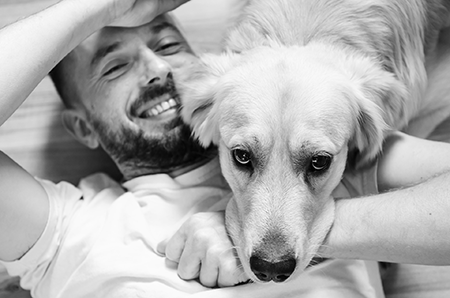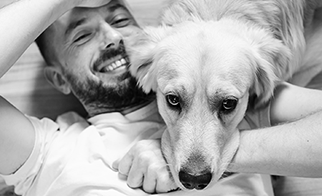
October is National Animal Safety and Protection Month! This month (and every month), it's important
for pet owners to learn about common health concerns, as well as tips for keeping their animals
healthy and safe.
Because dogs and cats can't tell us when they're in pain, it's up to us to notice those subtle signs
that indicate they're not feeling quite right. It's also our responsibility to be proactive about
their wellness and take steps to keep them healthy.
Below are 10 things every pet parent should know about animal safety and protection.
1. Stay up to date with vaccines and yearly vet check-ups.
Properly caring for your pet's health begins with yearly visits to your
veterinarian. Vets can use their
trained eye to examine your furry family member from ears to tail, and spot signs of trouble. These
visits will also ensure your pet is up to date on their immunizations.
2. Know the signs of an allergic reaction.
Just like humans, animals of all types and sizes can suffer from allergic reactions. Signs of an
allergic reaction include redness, itching, obsessive licking, swelling around the eyes or face,
vomiting, and difficulty breathing. If you suspect an allergic reaction, you should bring your
pet in for a vet check-up right away.
3. Keep your dog away from fatal human foods.
Many dog owners know that chocolate is bad for their pups. But did you know it can actually cause
severe symptoms like seizures, abnormal heart rhythms, and even death? Salty foods, onions, grapes,
raisins, nuts, and yeast dough are all among the worst foods for dogs.
4. Don't let your cat play with string.
There are few sights more adorable than a playful kitten attacking a ball of yarn. But cats have
been known to ingest yarn and string, which can result in a medical emergency. Ribbons, twine,
Christmas tree tinsel, and shoelaces should all be kept out of reach as well.
5. Keep pets away from household chemicals.
Animals are often curious about all sorts of objects and substances around the house - and that can
include dangerous household chemicals like detergents, bleach, fertilizers, glues and other cleaners.
These substances can cause harm not only if inhaled or swallowed, but also upon contact with your
pet's skin or fur. Keep your animals away from the area you're using the chemicals in, and store
all chemicals safely out of reach when you're finished.
6. Include your pet in your disaster preparedness plan.
When disaster strikes - whether it's an earthquake, fire, hurricane or blizzard - you never know what
could happen. It's important to plan ahead to ensure everyone in your family will have access to
food, water, shelter and medications, even if your power and water is cut. Stash several day's
worth of food, water and supplies for your pet in your emergency kit.
7. Don't keep toxic plants around the house.
Your new houseplant may be beautiful, but did you know it could also be fatal to your dog or cat?
Lilies, sago palms, tulips, pothos, aloe vera, areca palms, elephant ears, money plants and spider
plants are all on the list of houseplants that can be toxic and fatal to pets.
8. Know the signs of dehydration.
Pets can become dehydrated for a number of reasons, and this is a situation where it's important
to act quickly. Signs of dehydration in dogs and cats may include loss of skin elasticity, dry
mouth, sunken eyes, and exhaustion. See your vet as soon as possible if you notice these signs
so they can perform a full assessment.
9. Microchip your pets.
If your furry family member gets lost, a microchip could make the difference in whether they find
their way home or not. Collars and tags are not foolproof, as they can break or fall off. If your
pet gets lost and ends up in a shelter, a microchip will enable someone to access your contact
information and reunite you with your pup or kitty. If you move or change your phone number, be
sure to update your contact information accordingly.
10. Spay and neuter your pets.
Spaying and neutering your pets is a responsible choice for many reasons, including the fact that
it offers health benefits to your pet. Cats and dogs that have been neutered or spayed have a lower
risk of various types of cancers, and are less prone to problematic behaviors like aggression
and roaming.
Every loving pet parent wants the best for their animals, but it can be difficult to know which steps
you should take your keep your pets safe and healthy. We hope these quick tips make it easier to care
for your pet and keep them protected every month of the year.





